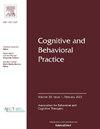Preliminary Feasibility, Acceptability and Referral Efficacy of a Drop-In Dialectical Behavior Therapy (DBT) Skills Group to Promote Enrollment in Standard DBT Skills Group
IF 2.9
3区 心理学
Q1 PSYCHOLOGY, CLINICAL
引用次数: 0
Abstract
Pretreatment interventions have been shown to increase treatment readiness, initiation, and participation in evidence-based treatments. To promote enrollment in an evidence-based Dialectical Behavior Therapy Skills Group (DBT; Linehan, 2015, Linehan et al., 2015), we developed a pretreatment Drop-In DBT Skills Group and evaluated the group’s feasibility, acceptability, and referral efficacy. Each session included a mindfulness practice and one of four introductory DBT skills. We assessed the Drop-In DBT Skill Group’s feasibility (clients attending ≥1 session), acceptability (clients attending ≥2 sessions), and referral efficacy (clients who sought referrals to the standard DBT Skills Group). In 8 months, 44 clients were referred to the Drop-In DBT Skills Group; 37 clients completed the screening process (84%). Of the 37 clients who responded to outreach, 32 attended ≥1 group or had already started the DBT Skills Group (86.5%; feasibility). Of the 32 clients who attended at least one group, 29 clients attended ≥2 Drop-In DBT Skills Groups or started the DBT Sills Group (90.6%; acceptability). Ultimately, 17 clients, including 13 DBT-ambivalent clients and 4 waitlisted clients, requested a referral to the standard DBT Skills Group. The Drop-In DBT Skills Group shows strong feasibility, acceptability, and referral efficacy in helping more ambivalent clients enroll in DBT Skills Group.
以 "随到随学 "的辩证行为疗法 (DBT) 技能小组促进标准 DBT 技能小组注册的初步可行性、可接受性和转介效果
治疗前干预已被证明可以提高循证治疗的治疗准备度、启动度和参与度。为了提高循证辩证行为疗法技能小组(DBT;)的注册率,我们开发了一种治疗前即兴 DBT 技能小组,并对该小组的可行性、可接受性和转介效果进行了评估。每节课都包括正念练习和四种 DBT 入门技能中的一种。我们评估了DBT技能小组的可行性(参加次数≥1次的客户)、可接受性(参加次数≥2次的客户)和转介效果(寻求转介到标准DBT技能小组的客户)。8 个月内,44 名客户被转介到 "DBT 技能小组";37 名客户完成了筛选过程(84%)。在回应外联的 37 名客户中,32 人参加了≥ 1 个小组或已经开始参加 DBT 技能小组(86.5%;可行性)。在至少参加了一个小组的 32 名客户中,有 29 名客户参加了≥2 个 "DBT 技能小组"(Drop-In DBT Skills Groups)或开始了 DBT Sills 小组(90.6%;可接受性)。最终,17 名客户(包括 13 名 DBT 不适应客户和 4 名候补客户)要求转介到标准 DBT 技能小组。随到随学 DBT 技能小组在帮助更多矛盾的客户加入 DBT 技能小组方面显示出很强的可行性、可接受性和转介效果。
本文章由计算机程序翻译,如有差异,请以英文原文为准。
求助全文
约1分钟内获得全文
求助全文
来源期刊

Cognitive and Behavioral Practice
PSYCHOLOGY, CLINICAL-
CiteScore
4.80
自引率
3.40%
发文量
118
审稿时长
84 days
期刊介绍:
Cognitive and Behavioral Practice is a quarterly international journal that serves an enduring resource for empirically informed methods of clinical practice. Its mission is to bridge the gap between published research and the actual clinical practice of cognitive behavior therapy. Cognitive and Behavioral Practice publishes clinically rich accounts of innovative assessment and diagnostic and therapeutic procedures that are clearly grounded in empirical research. A focus on application and implementation of procedures is maintained.
 求助内容:
求助内容: 应助结果提醒方式:
应助结果提醒方式:


